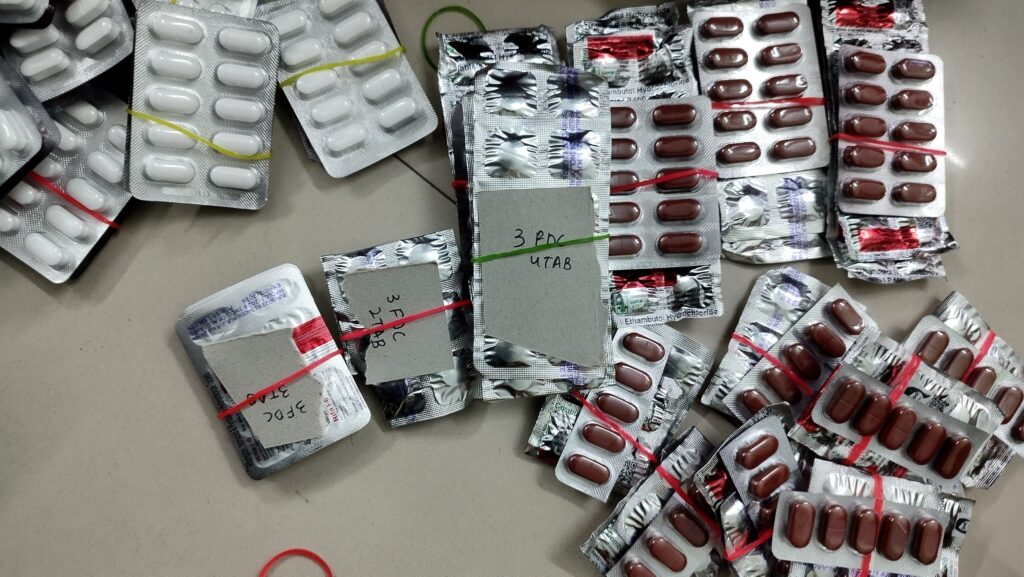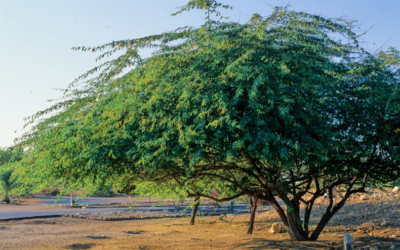Geeta Devi*, a resident of rural Bihar in Samastipur district listens intently to the team members from Innovators In Health as he tells her about which medicine to take and how much while handing over the tablet strips to her. Geeta’s daughter Seema* was diagnosed with Drug Sensitive TB (DSTB) four months ago. She is advised to ensure that her daughter takes medication on time, doesn’t skip doses, and eats a good diet. The duration of treatment for DSTB is minimum six months. For women like Geeta and Seema who belong to a marginalised community and rely on daily wages for income, this disease proves to be expensive and full of struggles.
Their struggle started in March this year when the government supply of DSTB medicine ran short and was out of stock at various places across the country.
Back in January, they used to get strips of fixed dose combination for 28 days. Now, they are getting it only for 5-10 days at a time. This causes anxiety to Geeta leaving her wondering whether her daughter will be able to complete her treatment. She says, “Since I’m uneducated, I find it difficult to comprehend which tablet to take and how much since the dosage keeps changing. So, I ask the person giving it, to mark the dosage on paper.“

Setbacks
Geeta is not alone in her plight. There’s Shambhu*, a daily wage labourer and a TB patient currently on medication for the second time. Last year, he stopped treatment as soon as his symptoms eased after three months. The shortage in supply of medicines is causing huge disruptions. The worry is whether this time he will be able to complete it. Doctors warn that interrupted treatment could result in disease getting worse and even result in treatment failure or relapse. Premature treatment interruption puts the patients at the risk of drug resistant TB.

Why Is There A Shortage
In an article published by The Hindu, in March 2024, a circular from the health ministry to all states mentions that the supply of certain drug sensitive medications may get delayed due to ‘unforeseen and extraneous circumstances’. The state governments have been asked to procure medications locally for three months. This has left the State TB Cells scrambling to arrange it. The circular also gives states the permission to reimburse the cost of medicine purchased by patients in case the district officials fail to provide it to them free of cost. In the last few years, this has happened way too many times.
I hear from my organization experts and leaders that in the Covid years, suddenly, due to the disruption in public health infrastructure, there was a significant drop in TB case reporting (which is not the same as drop in the illness itself). The cascading impact of that is that medicine issue reports reflected far lesser need than the reality. The inventory was not built. In the next couple of years, 2022-23, from other sources this gap was kept invisible, until now, when it no longer can be hidden.
Impact On Patients
Patients, especially from marginalized communities with poor socioeconomic background are getting the long end of the rope. Guardians of 8 year old Suman Kumari* belonging to musahar tola (marginalized group) are in a similar bind since their child was diagnosed with TB. They can’t afford to buy medicines themselves which is causing delays in treatment putting her at further risk of treatment failure or resistance to drugs. In such a scenario, unavailability of medication is adding to their woes.
20 year old Jeevach* has a similar story who used to take three pills daily but now he gets individual strips of medication only for 5 or 10 days. He is worried that if treatment is interrupted then disease might get worse and he won’t be able to go back to his previous job in the city.
It’s difficult to explain to the TB patients how many tablets to take from different strips so that they get appropriate dosage according to their weight band. Patients ask for dosage for more than 5 days which is difficult due to shortage of drugs- Sachin* (IIH team member)

Fighting TB With Hope
Pawan Sah*, a 55 year old who is suffering from TB for the third time, has a similar story. He decided to stop his medication when his wife came back from primary health center empty handed due to shortage of medication. Hope came in the form of Innovators In Health (India) in Samastipur (Bihar), running a TB programme since 2010. The organization works with community health workers along with various stakeholders in the public health domain to make public health institutions more inviting for poor people.
The TB medication stockout is a hurdle that they are navigating so patients do not suffer and complete their course of treatment. Among the many issues being faced currently is procuring medications as manufacturers are not able to meet the demand when the entire country is facing shortage of medicines. The team at IIH is supporting patients like Pawan in procuring medications and ensuring they take the correct dosage in this stockout situation.
The unprecedented drug stock out is a very challenging situation to deal with. If we don’t have drugs, why do we diagnose people then? Talking on equitable distribution of drugs, once an Uganda physician said “Where are the TB drugs? TB drugs are where there is no disease and where there is disease, there are no drugs”
Shailja Shah (Project Manager, IIH)
What Statistics Say
India has the highest burden of TB cases globally that is 27 percent according to WHO’s Global TB report 2023. India aims to eradicate Tuberculosis by the year 2025, way before the United Nations sustainable development goal of ending the TB epidemic by 2030. The country has also taken concrete steps like the National Tuberculosis Elimination Program (NTEP) which covers treatment of TB free of cost. Under NTEP, a web based portal called Nikshay has made it easy to monitor notified TB cases. Despite the best efforts, the country is way behind the finish line to achieve the target it set for itself.
India has been termed as ‘pharmacy capital of the world’ for being the largest manufacturer and exporter of generic drugs globally including many life saving drugs for chronic conditions. The world is looking at us when we fail to provide medicines to people in our own country.
For people like Seema, Suman, Shambhu, the stakes are very high given their socio-economic background. TB disease is wreaking havoc in the lives of these people physically and mentally and the medicine shortage has left them helpless scrambling in the dark to survive.
*Names changed to protect identity




0 Comments